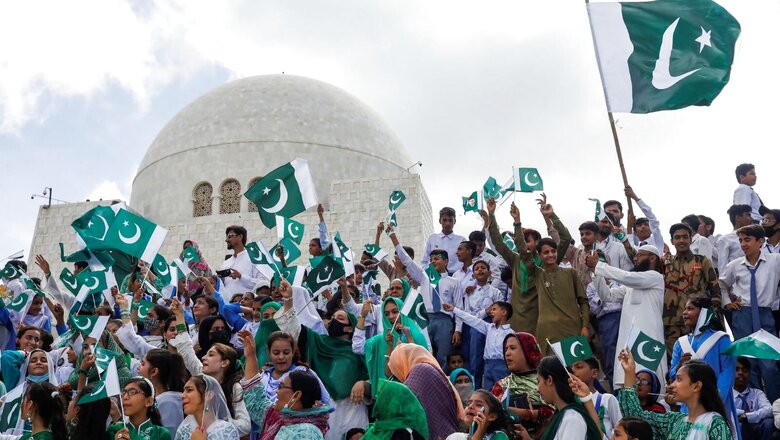
views
As dwindling forex reserves, nationwide power outages, stampedes at state-run food distribution centres and a Pakistani rupee, which plunged nearly 50 per cent in a year to 262 to the US dollar on Monday, propels the neighbouring country towards being an international “basket case”, Indian analysts believe there could be serious consequences for the region.
Amid this economic crisis, the Shehbaz Sharif government will begin crucial negotiations with the Washington-based IMF (International Monetary Fund) for a bail-out package on Tuesday which may come with “tough and possibly politically risky” pre-conditions of austerity, feeding into a bigger political crisis, they said.
The risk for India would not only be instability in Pakistan with its fall-out of rising extremism in the region but also unpredictable actions which could include bids to divert domestic public attention by focussing on an external enemy.
“The current economic crisis is feeding into the ongoing political crisis (where the Imran Khan-led Pakistan Tehreek-I-Insaf party has dissolved two provincial assemblies to force fresh elections)… the conditions that IMF is likely to impose for releasing money will of course cause a great deal of short-term pain which may have a political fall-out,” said Ambassador TCA Raghavan, former Indian envoy to Pakistan.
Disbursements from Pakistan’s $7 billion IMF bail-out (the 23rd since Independence) were stalled last November as the global lender of the last resort felt the country had not taken enough steps on fiscal and economic reforms to right-size the economy whose forex reserves have dwindled to $4.34 billion (from $16.6 billion a year back), barely enough to cover three weeks of imports. While its long-term debt has shot up to $274 billion, with some $8 billion due for re-payment this quarter.
Inflation has surged to 24 per cent with wheat and oil imports, on which the nation depends, becoming dearer and foreign investors including Chinese firms, which had shown interest in setting up factories in a much-touted economic corridor, scurrying away after a spate of terror attacks.
Economists said the IMF is likely to seek an increase in tax to GDP ratio as well as more realistic pricing of certain services including energy to generate more cash for the government to run itself and pay back loans.
“The bail-out is a must for Pakistan as a combination of high energy and food prices, rising unemployment, negative export earnings, flight of investment and shortages have made it the international basket case which Henry Kissinger (former US secretary of state) had thought Bangladesh would become,” pointed out Professor Biswajit Dhar, former director general of Research and Information System for Developing Countries, a Delhi-based think tank, and head, Centre for WTO Studies at IIFT.
Pakistan’s method of dealing with similar crisis in the past has been to “leverage its geo-political position and extract rent from global partners. That is not working as effectively this time … that is the real problem for its ruling class,” said Ambassador Raghavan.
“Pakistan had hoped that as in the past the triple As (Army, America and Allah) will somehow come to its aid again. However, times have changed … Army itself is a major cause of Pakistan’s financial problems as it absorbs the bulk of its budget. America is suffering from aid fatigue. In desperation, Pakistan’s finance minister has now appealed to Allah,” quipped Ambassador Rajiv Dogra, former permanent representative to UN’s Food and Agriculture Organisation and earlier India’s last consul general to Karachi.
Indian analysts including Raghavan and Dhar feel that the Sharif government and the Pakistan Army will delay elections to give time to the civilian government to implement reforms sought by IMF and make them palatable to the middle class who are likely to bear the brunt of austerity measures adopted.
“Under similar circumstances, a rational country will think seriously about the best possible way to get out of it (economic crisis). Here trading with India could be one option. Pakistan remains energy-starved and could benefit greatly by expanding energy relationships with India.
“Pakistan will have the advantage of a huge market in India. Its imports from India will be far cheaper. But going by past record, Pakistan will prefer to cut its nose rather than trade with India,” said Ambassador Dogra.
On the flip side, India too may not agree to such overtures. “The chances of India opening up to trade with Pakistan is slim given the fact that the current government’s political constituency may not favour such a move,” said Professor Dhar.
As a result, experts pointed out that Pakistan’s twin economic and political instability could explode in the neighbourhood in different ways.
Said Ambassador Dogra, “The current situation is ideal for terror groups to thrive … and Pakistan has a history of diverting its troublemakers to others in the region, especially India.” Pakistan saw a 28 per cent spike in terror attacks in calendar year 2022 compared to the year before, according to a report published earlier this month by Pakistan Institute of Conflict and Security Studies. Militants carried out 376 terror attacks, killing 533 and injuring another 832 people. December 2022 was the worst month with 49 attacks in which 56 people were killed, including 32 security forces personnel.
Other analysts too believe that while Pakistan is likely to remain “self-absorbed” as it deals with its crisis, other possibilities can never be ruled out.
“You can never be sure of what is happening (in Pakistan’s ruling elite’s thought process). Even at a very good time in our relations, Kargil happened. Nobody will ever rule out the possibility that something like that will not happen. You have to remain on your guard,” said Ambassador Raghavan.
Read all the Latest India News here




















Comments
0 comment